|
 Laccaria ohiensis Laccaria ohiensis
SynonymsLaccaria tetraspora
Laccaria tetraspora f. major
Laccaria tetraspora f. tetraspora
Laccaria tetraspora var. major
Laccaria tetraspora var. tetraspora
Laccaria tortilis
Agaricus ohiensis
Laccaria laccata
BiostatusPresent in region - Exotic
Images (click to enlarge)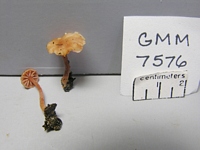
Caption: Laccaria ohiensis?: 7576: PILEUS: 8-15 mm diam, broadly convex, moist, glabrous to finely fibrillose, translucent, orange brown. LAMELLAE: adnexed, distant, thick, 1 mm broad, entire, pinkish. STIPE: 20-25 x 2 mm, equal, glabrous, concolorous with pil
Owner: Greg Mueller | 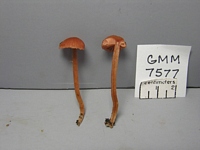
Caption: Laccaria ohiensis?: 7577: PILEUS: 15 mm diam, convex, finely fibrillose, translucent, slightly sulcate at margin, orange brown. LAMELLAE: adnexed, distant, thick, 4 mm broad, entire, pinkish. STIPE: 50 x 3 mm, equal, finely fibrillose, concolorous wi
Owner: Greg Mueller | 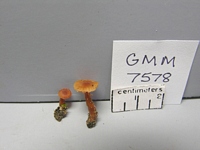
Caption: Laccaria ohiensis?: 7578: PILEUS: 5-10 mm diam, broadly convex, finely fibrillose, translucent, dark orange brown at disc, orange brown away. LAMELLAE: adnexed, distant, thick, 2 mm broad, entire, pinkish. STIPE: 10-15 x 2 mm, finely fibrillose, conco
Owner: Greg Mueller | 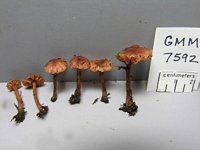
Caption: Laccaria ohiensis?: 7592: PILEUS: 8-16 mm diam, broadly convex to plane, finely fibrillose, translucent, reddish brown. LAMELLAE: adnexed, distant, thick, 2-3 mm broad, concolorous with pileus. STIPE: 20-30 x 1-3 mm, equal, glabrous, concolorous with
Owner: Greg Mueller | 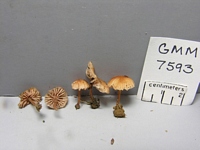
Caption: Laccaria ohiensis?: 7593: PILEUS: 15-20 mm diam, broadly convex to plane, glabrous to finely fibillose, translucent, reddish brown to orange brown faded pale tan. LAMELLAE: adnexed, distant, thick, 2-3 mm broad, pinkish to pale. STIPE: 10-15 x 1-2 mm
Owner: Greg Mueller | 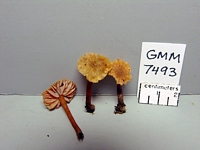
Caption: Laccaria ohiensis?: 7493: PILEUS: 10-22 mm diam, broadly convex to plane, uneven to finely scaley, undulate, translucent, dark reddish brown. LAMELLAE: adnexed, distant, thick, 1-2 mm broad, entire, pinkish. STIPE: 15-30 x 2-3 mm, equal, glabrous, co
Owner: Greg Mueller | 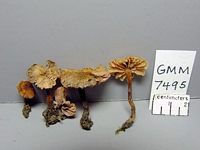
Caption: Laccaria ohiensis?: 7495: PILEUS: 10-30 mm diam, broadly convex to plane, often shallow depression, finely scaley, sulcate, reddish brown. LAMELLEA: adnexed, distant, thick, 2-3 mm broad, enitre, reddish. STIPE: 20-25 x 3-5 mm, equal, glabrous, conco
Owner: Greg Mueller | 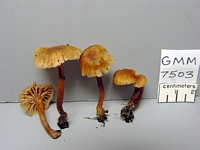
Caption: Laccaria ohiensis?: 7503: see photo, glabrous stipe, medium sized spores with medium long spines,
Owner: Greg Mueller | 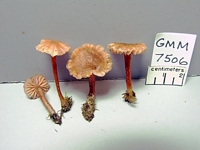
Caption: Laccaria ohiensis?: 7506: see photo, globose spores, rel. small spines
Owner: Greg Mueller | 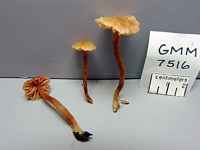
Caption: Laccaria ohiensis?: 7516: PILEUS: 12-20 mm diam, broadly convex, glabrous, undulate, translucent, reddish brown. LAMELLAE: adnate, distant, moderately thick, pinkish. STIPE: 35-40 x 2 mm, equal, finely fibrillose striate, concolorous with pileus.
Owner: Greg Mueller | 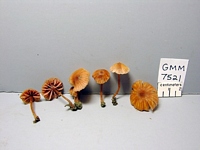
Caption: Laccaria ohiensis?: 7521: PILEUS: 10-25 mm diam, convex to broadly convex, some depressed, glabrous to undeven, strongly sulcate, translucent, reddish brown disc 7e8, paler away. LAMELLAE: adnexed, distant, thick, up to 5 mm broad, entire, concolorous
Owner: Greg Mueller | 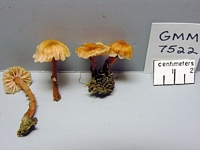
Caption: Laccaria ohiensis?: 7522: PILEUS: 12-18 mm diam, broadly campanulate to broadly convex, shallow depressed, finely fibrillose, strongly sulcate, translucent, reddish brown fading paler; margin decurved to upturned, undulate to erroded. LAMELLAE: adnexed,
Owner: Greg Mueller | 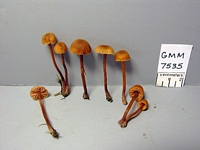
Caption: Laccaria ohiensis?: 7535: PILEUS: 8-20 mm diam, convex to broadly convex, often depressed, glabrous to uneven, strongly translucent striate, orange brown (6c6-7). LAMELLAE: adnexed, distant, thick, 3 mm broad, entire, dark pinkish. STIPE: 30-40 x 2
Owner: Greg Mueller | 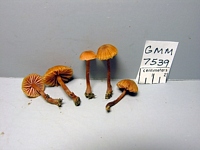
Caption: Laccaria ohiensis?: 7539: PILEUS: 8-20 mm diam, convex to broadly convex, glabrous to finely fibrillose, often depressed, sulcate at margin, slightly transluscent, reddish brown. LAMELLAE: adnexed, distant, relatively thin, 2-3 mm broad, entire, dark p
Owner: Greg Mueller | 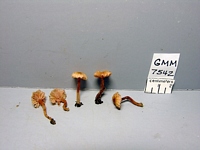
Caption: Laccaria ohiensis?: 7542: PILEUS: 10-12 mm diam, broadly convex to plane, depressed, glabrous to finely fibrillose, undulate, translucent at margin, dark reddish brown fading paler. LAMELLAE: adnate, distant, thick, 2-3 mm broad, dull vinaceous. STIP
Owner: Greg Mueller | 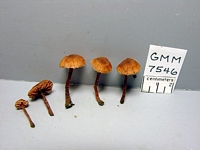
Caption: Laccaria ohiensis?: 7546: PILEUS: 7-18 mm diam, broadly convex to plane, often depressed, glabrous to finely fibrillose, translucent to disc, dark reddish brown. LAMELLAE: adnexed, distant, thick, 2 mm broad, entire, dark pinkish to reddish brown. STI
Owner: Greg Mueller | 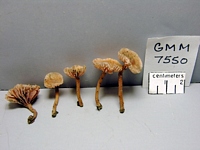
Caption: Laccaria ohiensis?: 7550: PILEUS: 12-25 mm diam, plane to uplifted, glabrous, finely translucent at margin. LAMELLAE adnate, moderately distant, thick, 2 mm broad, dark vinaceous pink to nearly concolorous with pileus. STIPE: 10-15 x 1-2 mm, equal, g
Owner: Greg Mueller | 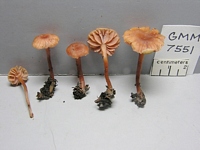
Caption: Laccaria ohiensis?: 7551: PILEUS: 10-22 mm diam, broadly convex to plane, some depressed, glabrous, strongly translucent to disc, reddish brown (7d7-8), fading paler; margin decurved to uplifted, undulate. LAMELLAE: adnexed, distant, thick, 2 mm broad,
Owner: Greg Mueller | 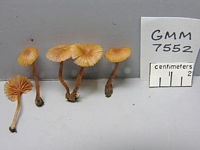
Caption: Laccaria ohiensis?: 7552: PILEUS: 8-15 mm diam, broadly convex, glabrous to finely fibrillose, translucent striate to disc, medium brown (6c-d6-7); margin decurved, entire. LAMELLAE: adnexed, moderately distant, relatively thin, 2 mm deep, entire, pink
Owner: Greg Mueller | 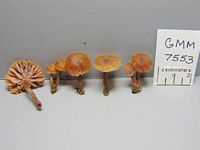
Caption: Laccaria ohiensis?: 7553: PILEUS: 15-25 mm diam, convex to broadly convex, glabrous to finely fibrillose, translucent, dark reddish brown. LAMELLAE: adnexed, distant, thick, 2-3 mm broad, entire, dark reddish pink. STIPE: 15-20 x 2-3 mm, glabrous to
Owner: Greg Mueller | 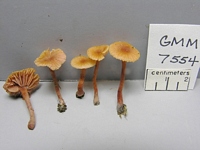
Caption: Laccaria ohiensis?: 7554: PILEUS: 7-20 mm diam, broadly convex to uplifted, often depressed, glabrous translucent, reddish brown at disc, faded to medium brown away. LAMELLAE: adnexed, distant, thick, 2-3 mm broad, pink. STIPE: 20-35 x 1-2 mm, equal,
Owner: Greg Mueller | 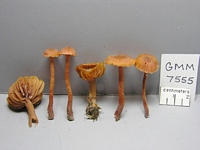
Caption: Laccaria ohiensis?: 7555: PILEUS: 7-25 mm diam, campanulate to convex to broadly convex to uplifted, some depressed, glabrous becoming finely fibrillose when fading, strongly translucent to disc, dark reddish brown when young, fading away from disc with
Owner: Greg Mueller | 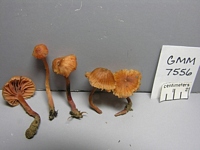
Caption: Laccaria ohiensis?: 7557: PILEUS: 10-25 mm diam, broadly convex to uplifted, glabrous becoming finely fibrillose, strongly translucent, vinaceous to reddish brown. LAMELLAE: adnexed, distant, relatively thin, up to 4 mm broad, dark pinkish to reddish b
Owner: Greg Mueller | 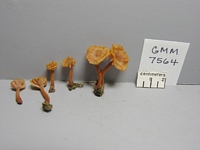
Caption: Laccaria ohiensis?: 7564: PILEUS: 10-18 mm diam, uplifted, finely fibrillose, shallow sulcate, translucent, orange brown (6c-d7-8); margin upturned, undulate. LAMELLAE: adnexed, distnant, thick, 1-2 mm broad, entire, dark salmon (6a3-4). STIPE: 12-25
Owner: Greg Mueller | 
Owner: Barbara Segedin | 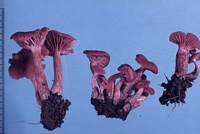
Owner: Herb. PDD | 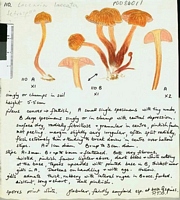
Caption: Watercolour
Owner: G.M. Taylor | 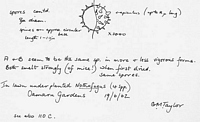
Caption: Watercolour
Owner: G.M. Taylor | 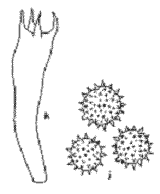
Caption: L. tetraspora - j, spores; k, basidium | 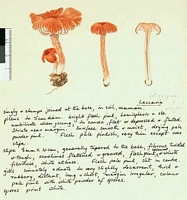
Caption: Watercolour
Owner: G.M. Taylor | 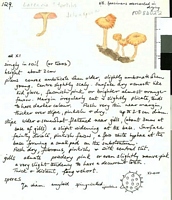
Caption: Watercolour
Owner: G.M. Taylor | 
Caption: Fig. 7 | 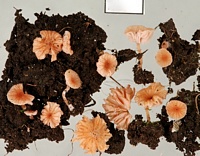
Owner: J.A. Cooper | 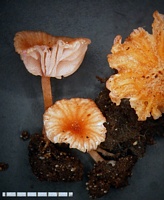
Owner: J.A. Cooper |
Article: McNabb, R.F.R. (1972). The Tricholomataceae of New Zealand. 1. Laccaria Berk. & Br. New Zealand Journal of Botany 10(3): 461-484 (http://www.rsnz.org/publish/abstracts.php).
Description: PILEUS: 0.5-2 cm diam., convex when young, plano-convex,
applanate or centrally depressed at maturity, hygrophanous, non-viscid, faintly
or conspicuously pellucid-striate when wet, striae extending to half distance
between margin and centre of pileus, glabrous when wet, finely furfuraceous
when dry, pallid reddish brown, sometimes tinted yellowish brown, drying buff.
Cuticle composed of unspecialised, repent, parallel or slightly interwoven,
thin-walled, clamped hyphae 6-12 µm diam. LAMELLAE: adnexed to adnate, distant,
intermixed, thick, to 4 mm deep, pallid flesh pink, often with pallid yellowish
tints, glaucous. STIPE: 1-2.5 cm long, ± equal, 1.5-4 µm diam., dry, hollow,
subglabrous to finely and sparingly longitudinally fibrillose, often finely
furfuraceous, concolorous with pileus or slightly darker; flesh concolorous;
basal mycelium white.
SPORES: spore print white when fresh; spores globose
to subglobose, apiculate, hyaline, inamyloid, moderately echinulate, 9.5-13.5
µm diam. including spines, spines 1.2-2 µm long. HYMENIUM: basidia subclavate
to clavate, 35-55 X 7-11.5 µm, 4-spored, sterigmata to 8 µm long; paraphyses
sparse, simple, cylindrical to subclavate, occasionally irregular, to 4 µm diam.
HYMENOPHORAL TRAMA: regular, composed of tinted, parallel, long-celled hyphae;
clamp connections present. CONTEXT OF PILEUS: thin, concolorous with pileus.
SMELL AND TASTE: not distinctive. CHEMICAL CHARACTERS: FeSO4 on pileus and context—rapidly
dark grey; KOH and NH4OH on pileus and context— n.r.
Habitat: Gregarious to caespitose under Leptospermum
and Nothofagus.
Notes: New Zealand collections agree closely with the type
description of Laccaria tetraspora, and with a later description of the
species by Singer (1952). In a subsequent publication. Singer (1967) recognised
seven varieties and two forms of L. tetraspora, based primarily on spore
size, height of spore ornamentation, and size of fructifications. New Zealand
specimens fit readily within Singer's concept of var. tetraspora f. tetraspora,
a taxon also occurring in Nothofagus areas of South America.
Laccaria tetraspora
has often been confused with L. laccata. In a discussion of the identity
of L. laccata. Singer (1967) concluded that L. laccata var. laccata
as interpreted by. Fries was a small, reddish brown species with a cap to 3
cm diam. and a stipe to 8 cm long. It possessed finely echinulate, subglobose
to short-elliptical spores 8.5-9.5 X 6.7-8 µm, with spines rarely more than
1 µm long. Thus L. tetraspora differs from L. laccata in the larger,
globose to subglobose spores with spines to 2 µm long.
L. tetraspora
f. tetraspora is characterised by the small fructifications, subglabrous
to inconspicuously longitudinally fibrillose stipe, and globose to subglobose,
moderately echinulate spores. The species has not previously been recorded from
New Zealand, and its presence in undisturbed Nothofagus forest suggests
that it is an indigenous species.
Article: McNabb, R.F.R. (1972). The Tricholomataceae of New Zealand. 1. Laccaria Berk. & Br. New Zealand Journal of Botany 10(3): 461-484 (http://www.rsnz.org/publish/abstracts.php).
Description: PILEUS: 2-5 cm diam., hemispherical or convex when young, convex, plano-convex,
applanate, or centrally depressed with reflexed margins at maturity, hygrophanous,
non-viscid, faintly pellucid-striate when wet, subglabrous to finely furfuraceous
when wet, furfuraceous to minutely squarrose when dry, brick red to reddish
brown, drying pallid fawn to buff. Cuticle composed of unspecialised, repent,
parallel or slightly interwoven, thin-walled, clamped hyphae 7-15 µm diam. LAMELLAE:
adnexed, adnate or occasionally subdecurrent, distant, intermixed, thick, to
7 mm deep, flesh pink, glaucous. STIPE: 2-6 cm long, ± equal or tapering apically,
3-8 mm diam., dry, hollow, often twisted, coarsely longitudinally fibrillose
giving stipe a silky sheen, reddish brown; flesh concolorous or slightly paler;
basal mycelium white.
SPORES: spore print white when fresh: spores globose
to subglobose, apiculate, hyaline, inamyloid, moderately echinulate, 9.5-13.5
µm diam. including spines, spines to 2 µm long. HYMENIUM: basidia subclavate
to clavate, hyaline, 40-65 X 9-13 µm, 4-spored, sterigmata to 9 µm long; paraphyses
simple or sparingly branched, cylindrical or irregular, to 4 µm diam. HYMENOPHORAL
TRAMA: regular, composed of tinted, parallel, long-celled hyphae; clamp connections
present. CONTEXT OF PILEUS: reddish brown. SMELL AND TASTE: not distinctive.
CHEMICAL CHARACTERS: FeSO4 on pileus and context—rapidly dark grey; KOH and
NH4OH on pileus and context— n.r.
Habitat: Gregarious under introduced trees.
Notes: Microscopically, Laccaria tetraspora
f. major is indistinguishable from f. tetraspora, but fresh specimens
can be recognised by the larger fructifications and coarsely longitudinally
fibrillose stipe. The taxon has not previously been recorded from New Zealand
and in contrast to f. tetraspora, appears to be associated only with
introduced trees.
Article: Stevenson, G. (1964). The Agaricales of New Zealand: V. Kew Bulletin 19(1): 1-59.
Description: The New Zealand collection fits this species in the sense of Boudier (and of Singer in Sydowia 6: 177 (1952)) with spores 7 µm diam., thickly set with sharp spines 1-2 µm long (Fig. 7).
Habitat: Under scrub, Wellington Botanic Garden, 1.7.1949, Stevenson.
Article: Stevenson, G. (1964). The Agaricales of New Zealand: V. Kew Bulletin 19(1): 1-59.
Description: This usually brick-red species is the commonest toadstool in New Zealand
occurring under both native and exotic woody vegetation at all times of the
year. Singer (1951) describes the spores as ellipsoid or globose, not more than
10 µm, with spines less than. 1 µm. long. The writer has examined specimens L.
laccata in The Kew Herbarium which show the following spore characters:-
(1)
coll. J. E. C. Aberdeen, Queensland, 4.8.1952;
spores globose, 8-9 µm diam., spines in, close-set.
(2)
coll. R. W. G. Dennis, Portugal, 16.10.1955;
spores ovoid 8-9 x 10-11 µm, spines 0.5 µm.
(3)
Herbarium Berkeley, coll. in Tasmania; spores
ovoid 8-9 x 10-11 µm, spines 0.5 µm.
Lange (1935) describes the spores of C. (Laccaria)
laccata var. proxima, as ovate-globose, minutely echinulate, 7.5-9 x
6.75-7.5 µm, with spines 1 µm long, but mentions also collections with large
globose, spores and comments, probably the form of the spore is not constant;
Rea (1922) states that both elliptical and globose spores have been found on
the same plant, but this does not seem to have been confirmed and is contrary
to the writer's observations.
New Zealand collections which have been examined usually have globose
spores, 9-10 µm diam., with well-developed spines, but ovoid spores have also
been seen. More information about the distribution of spore forms in relation
to macroscopic characters would be interesting.
Notes: This mixed description also incorporates L. proxima
|